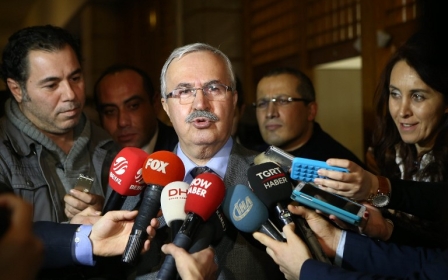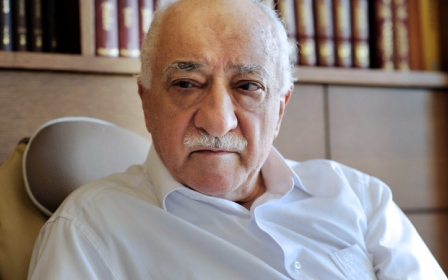Erdogan-Gulen row reaches new peak

In the latest round of a bitter, years-long feud between Turkish President Recep Tayyip Erdogan and Hizmet leader Fethullah Gulen, the US-based cleric has accused the Turkish government of pushing the country to the brink of totalitarianism.
"By viewing every critical voice as an enemy - or worse, a traitor - they are leading the country toward totalitarianism," Gulen said in a New York Times op-ed column published this week.
Gulen's rare comments came on the same day that Turkish officials confirmed rumours that they had revoked his passport. Also on Tuesday, Turkey's banking watchdog seized control of an Islamic bank seen as the financing arm of Gulen’s network, saying that the bank was not operating transparently.
In the Times, Gulen accused the ruling Justice and Development Party (AKP) of clamping down on civil society and squandering a "historic opportunity" for Turkey to become a progressive and EU member state.
He said the rhetoric used by the AKP to crack down on the group was "a pretext to justify their own authoritarianism".
“Turkey has now reached a point where democracy and human rights have almost been shelved,” Gulen said, calling on “Turkish people...[to] exercise their legal and democratic rights again to reclaim the future of their country.”
While Gulen’s column was widely shared by his supporters, it received sharp criticism from many Turkish analysts who voiced their opinions via social media.
The Pennsylvania-based Gulen has lived in self-imposed exile in the US since 1999. For years he was seen as a close ally of the AKP and Erdogan, but since 2013, Erdogan and his ruling AK Party have accused Gulen and his supporters of seeking to establish a “parallel state” in Turkey and of orchestrating a corruption investigation.
While Gulen has denied the accusations, the Turkish government launched a massive arrest campaign against his Hizmet movement supporters in the judiciary and police services.
On Tuesday, the state-run Savings Deposit Insurance Fund seized control and sacked the entire management team of Gulen-linked Bank Aysa.
The bank lost almost half of its deposits in the first nine months of 2014 after it became embroiled in the ongoing power struggle between Erdogan and Gulen, the Wall Street Journal reported.
In the third quarter of last year, Erdogan publicly declared the lender “bankrupt” and called on regulators to act.
In December, a newspaper and television channel loyal to Gulen were targeted by police raids, prompting the European Union to accuse Ankara of eroding press freedoms.
Hidayet Karaca, head of the Samanyolu broadcaster who has been jailed since December, said the case against Gulen and senior media executives was politically motivated, reported the Guardian on Tuesday.
“The police raids and arrests have become part of a strategy by the AKP government to silence the free press," Karaca said.
Stay informed with MEE's newsletters
Sign up to get the latest alerts, insights and analysis, starting with Turkey Unpacked
Middle East Eye delivers independent and unrivalled coverage and analysis of the Middle East, North Africa and beyond. To learn more about republishing this content and the associated fees, please fill out this form. More about MEE can be found here.




